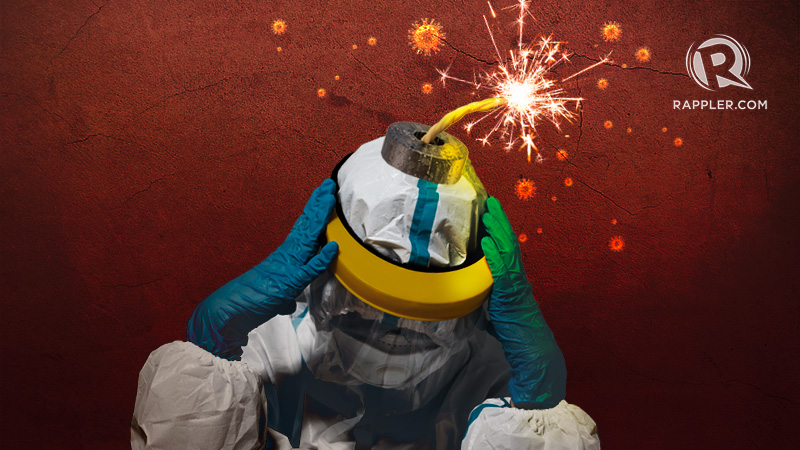

While demolishing the COVID-19 curve, our health workers are precariously riding another one just behind it. It is the alarm bell curve of psychological trauma. And that line is long and deep with no end in sight.
The experience of over 1,200 nurses and physicians in 34 hospitals across China is a visceral warning. In a study published in the JAMA Network Open, symptoms of depression, anxiety, sleep problems, and distress were common, especially among those in direct care of patients with the virus.
It’s too early to tell if we can say the same about our own frontliners. Mental health data here in the country is not yet a mosaic of evidence. But it’s likely that something ominous is going on. Our health workers are saluted as heroes, but alas they are no gods.
Life-and-death decisions, sleep deprivation, hunger, demoralization, family separation, inescapable pain, unpredictable loss, wishing to give up followed by furious guilt – to liken this to battlefield medicine is tempting. To compare our health workers to soldiers seems like a microscopically meaningful action, some sort of project to signal our fixation on status.
Not that our health workers are less deserving of a ticker-tape parade. If anything, their low pay, limited work benefits, and grossly inadequate supplies – long before the virus hit our shores – feed into our failure to imagine more sympathetically their predicament. We do not value them as much as we say we do. (READ: Frontliners: ER doctor deals with grief, death in the coronavirus pandemic)
Most of us have never fought in combat nor lived through war. Yet we evoke the trenches with righteousness absent of any battlefield memory. The comparison paints a bayanihan story but seems more like a prolonged slow let-down. Our operational and tactical support do not offer a glimmer of light that will ultimately sustain their mental well-being long after the COVID-19 curve flattens.
The Mental Health Act is advertised as community mental health (CMH) but, by design, retains the service paradigm. It’s a vision of the world that sees clinical services, whether in the local barangay or the tertiary hospital, as the sole and fully legitimate way of helping people with mental health problems. (READ: In their own words: Frontliners on their fears, hopes during the pandemic)
Health workers should call hotlines or contact one of the many thriving online or mobile counselors. Their symptoms need to be reduced and managed. This is the service paradigm to a tee, but community mental health is something else entirely.
I wonder if in this pandemic health workers participate in the decisions that directly affect their mental well-being. In CMH, they are not passive recipients of hotline numbers from directives of technical working groups. The frontliners themselves get to decide if the hotlines are even the way to go. How do they envision the health care system prioritizing their mental wellbeing? Have we asked them into the room where those weighty choices are made? (READ: Braving a pandemic: Frontliners battle fear to confront the novel coronavirus)
Academics and professionals claim a whole-of-society approach, but in reality it’s much closer to a select-few-of-society strategy.
And what about peer support? Are hospitals and task forces creating enabling conditions so that health workers can get emotional help, tips, and socializing from each other? Those who are going through the same horror are the real source of tangible support against the burdens of their psychological trauma, not the so-called experts and their professionally delivered treatments.
Talking out our problems has powerful benefits. There’s no doubt that if our health workers make the call to the hotlines, it will be the start of their healing.
Where we fall short is why our idea of mental health is only when things go wrong. What are we doing so that they don’t have to make that call at all?
The mental health law, of course, is for all of us, but around the decision-making table were mostly experts. This pandemic is a test of whether that power grab fulfills the promise for their fellow frontliners. – Rappler.com
Dr Ronald Del Castillo is professor of psychology, public health, and social policy at the University of the Philippines Manila. The views here are his own.